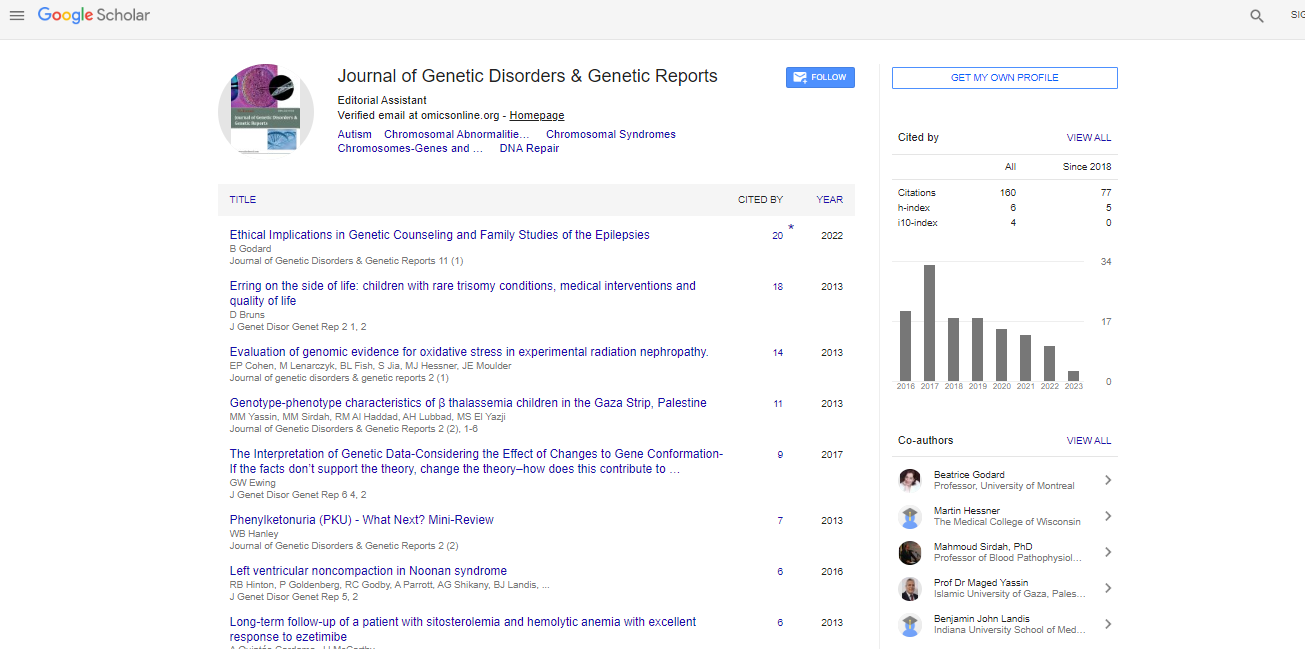Opinion Article, J Genet Disor Genet Rep Vol: 12 Issue: 4
Precision Medicine in Genetic Disorders: Current State and Future Prospects
Cindy Hiwai*
1Division of Medical Genetics, University of Cape Town, Cape Town, South Africa
*Corresponding Author: Cindy Hiwai,
Division of Medical Genetics, University of
Cape Town, Cape Town, South Africa
E-mail: hiwaicindy5@gmail.com
Received date: 25 July, 2023, Manuscript No. JGDGR-23-113891;
Editor assigned date: 28 July, 2023, PreQC No JGDGR-23-113891(PQ);
Reviewed date: 11 August, 2023, QC No JGDGR-23-113891;
Revised date: 21 August, 2023, Manuscript No JGDGR-23-113891(R);
Published date: 28 August, 2023, DOI: 10.4172/2576-1439.1000222.
Citation: Hiwai C (2023) Precision Medicine in Genetic Disorders: Current State and Future Prospects. Int J Genet Dis Genet Rep 12:4.
Abstract
Description
Precision medicine has emerged as a transformative approach to healthcare, particularly in the field of genetic disorders. An overview of the current state of precision medicine in genetic disorders, including its principles, applications, challenges, and the potential future prospects it offers. The integration of genomics, advanced diagnostics, and tailored therapies is revolutionizing the management of genetic conditions, ultimately improving patient outcomes and quality of life.
Genetic disorders encompass a wide range of conditions caused by mutations in specific genes or genomic regions. Traditionally, these disorders were managed with a one-size-fits-all approach, often resulting in suboptimal outcomes. Precision medicine, however, has led into a new era of personalized healthcare, allowing for tailored diagnostics and treatment strategies based on an individual's unique genetic makeup.
Hereditary issues are a different gathering of illnesses brought about by transformations or modifications in a singular's Deoxyribonucleic Acid (DNA). They can appear in a great many side effects and seriousness levels, making finding and treatment frequently testing. Customary ways to deal with hereditary turmoil the executives have to a great extent depended on a one-size-fits-all model, which may not be powerful for all patients because of hereditary changeability.
Principles of precision medicine in genetic disorders
Genomic sequencing: The cornerstone of precision medicine in genetics is high-throughput genomic sequencing, which allows for the identification of genetic variants responsible for a particular disorder.
Stratification of patients: Precision medicine categorizes patients into subgroups based on their genetic mutations, enabling targeted interventions.
Individualized therapies: Tailored treatments are designed to address the specific genetic causes of a disorder, maximizing efficacy while minimizing side effects.
Applications of precision medicine in genetic disorders
Cancer genomics: Precision oncology has revolutionized cancer treatment, with therapies targeting specific mutations that drive tumor growth.
Rare genetic disorders: Precision medicine has provided hope for individuals with rare genetic conditions, offering potential treatments for previously untreatable diseases.
Pharmacogenomics: Genetic variations that affect drug metabolism and response are considered in medication selection and dosing, reducing adverse reactions.
Challenges in precision medicine
Data privacy and security: The storage and sharing of genetic data require robust privacy measures to protect sensitive information.
Cost and accessibility: High costs associated with genomic sequencing and personalized therapies may limit access for some patients.
Ethical considerations: Complex ethical issues, such as genetic discrimination and informed consent, must be carefully addressed.
Data interpretation: The interpretation of genetic data is complex, requiring specialized expertise and bioinformatics tools.
Future prospects
Advancements in diagnostics: Continued innovations in genomic sequencing and diagnostics will enhance our ability to identify disease-causing variants.
Expanding therapeutic options: Research into targeted therapies and gene editing technologies accomplish for developing treatments for a broader range of genetic disorders.
Population health impact: Precision medicine has the potential to reduce the overall burden of genetic diseases by preventing and treating conditions at the genetic level.
Conclusion
Precision medicine has reshaped the landscape of genetic disorder management, offering tailored solutions based on individual genetic profiles. While challenges such as data privacy and accessibility persist, ongoing research and technological advancements to overcome these obstacles. As precision medicine continues to evolve, it holds the potential to transform the lives of individuals with genetic disorders, providing more effective treatments and improving the overall health of populations. Embracing this paradigm shift in healthcare is essential to realizing the full potential of precision medicine in the field of genetics.
 Spanish
Spanish  Chinese
Chinese  Russian
Russian  German
German  French
French  Japanese
Japanese  Portuguese
Portuguese  Hindi
Hindi 



